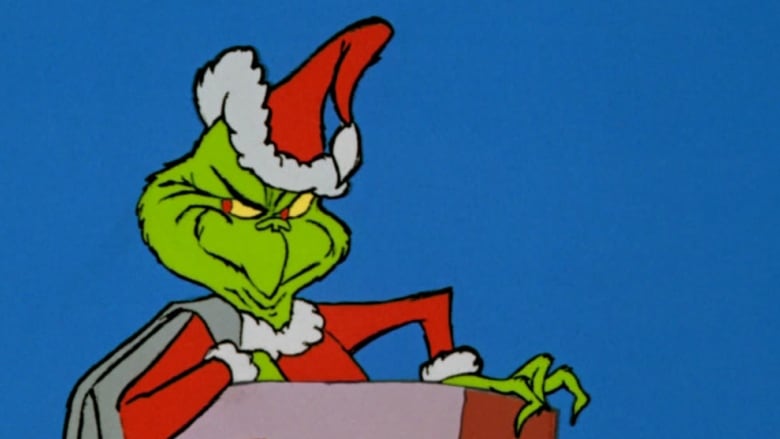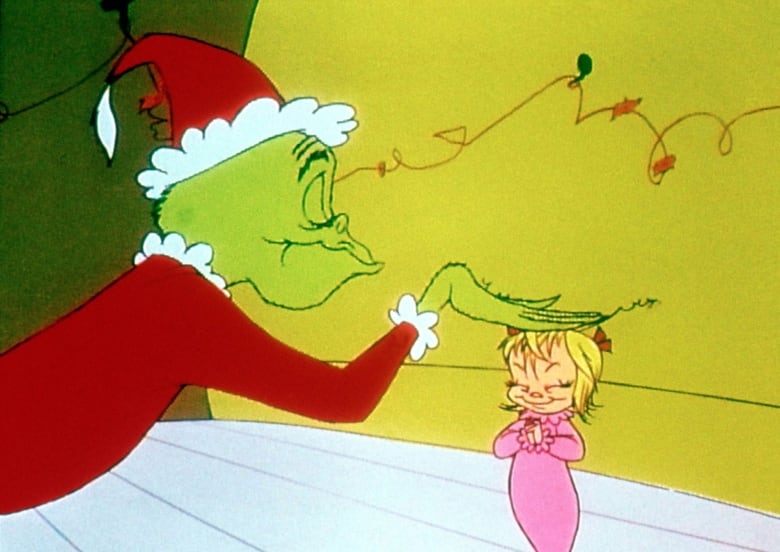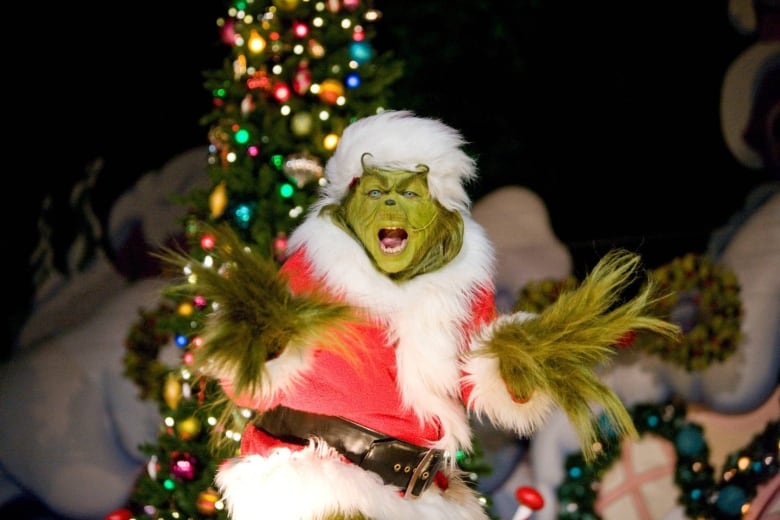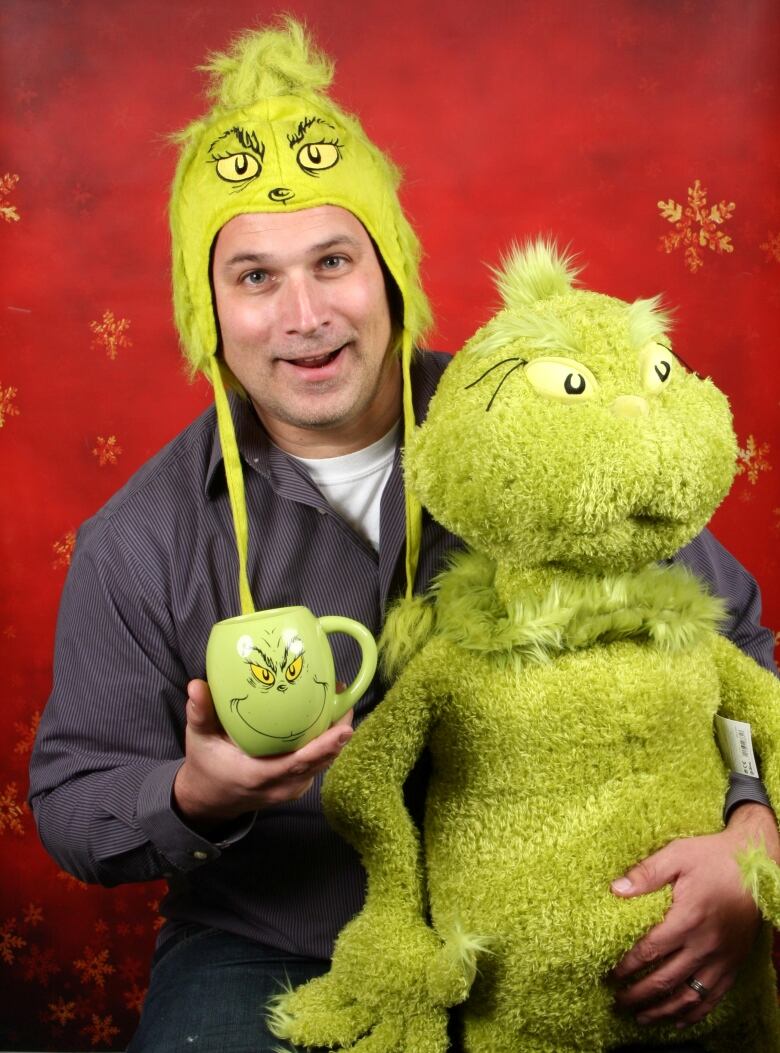'You're a mean one, Mr. Grinch,' but you've lasted 50 years on TV: Here's why
Feel-good holiday classic lauded for quality of animation, memorable music and great characters

Poor little Cindy Lou Who when you're no more than two, seeing "Santy Claus" taking away your family's Christmas tree really is too much to bear.
Yet that's exactly what happened on TV screens for the first time on Dec. 18, 1966 and every December since.
Of course, the "Santy Claus" stuffing the Who family tree up the chimney is themean-spirited recluse at the heart of Dr. Seuss' How the Grinch Stole Christmas!an animated television special that has endured for half a century. (It will be broadcast again on CBC Dec. 20 at 8 p.m.)

Veteran TV columnist Bill Brioux was nine when the show premiered.
"I was under its spell and have been all 50 years," says the Brampton, Ont.-based Brioux. "I think it's just a tremendous special."
'Clever animation'
Still, in the words of little Cindy Lou, "why, why" would such a simple and charming TV show endure as it has, especially in today's instant download, multiplatform, overly commercialized world?
Brioux has a list of reasons for such staying power. There's great animation by great animators, memorable music like "You're a mean one, Mr. Grinch" and great characters in a great story. Plus there's great voices, including Boris Karloff who once was Frankenstein as the Grinch.
"They just did a lot of clever animation with that character and his voice. He was a mean one and you bought it," says Brioux.

"Here he was stealing Christmas. On a child level, what could be worse? It was just delightful the way it unfolded. So I just think great storytelling and music and talent."
The Grinch was the third of three feel-good holiday classics that hit the small screen in the mid-1960s. Rudolph the Red-Nosed Reindeer came in 1964. A Charlie Brown Christmas arrived in the 1965. The Grinch premiered the next year.
"Here's what's the extraordinary thing: the message of the Grinch is that Christmas doesn't come from a store," says Brioux.
"Can you imagine pitching this in the mid-'60s? We want to get sponsors but the message is basically that people don't need the gifts."
And maybe something of that message that commercialism isn't everything resonates for some today.
"That was pretty radical in 1966 and I think people maybe respond to that as well," says Brioux. "They don't feel like they're being conned into buying something by watching this show."
What about aGrinchmug?
Of course, some commercial elements do surround the Grinch.
That irony is not lost on Tyler Schwartz, founder ofRetroFestive, an online retailer of Christmas merchandise in Oakville, Ont.
"We sell a lot of Grinch stuff," says Schwartz. "It's pretty amazing 50 years later how popular the green guy is."

Grinch ornaments and costumes sell well. So do the mugs Schwartz says they may be intended for the "Grinchy" boss or co-worker, "that guy in the office who secretly is a teddy bear but comes across as a little bit gruff."
But one of RetroFestive's more popular items this year was a sign spelling out a thought that eventually comes to the Grinch, that "Maybe Christmas doesn't come from a store. Maybe Christmas perhaps means a little bit more!"
Schwartz thinks there are a couple of reasons why the Grinch has endured.
One is "the redemption story of the bad guy kind of being redeemed and coming around at the end to being a good guy."
The other is that idea that maybe Christmas doesn't in fact come from a store.
'Really hits home'
"That really hits home for people even 50 years later when Christmas is probably twice or 10 times as commercialized as it was back then," says Schwartz.
And maybe there's a longing for a simpler time.
"I think that's why these specials still resonate with people who grew up on them especially," says Schwartz, who's 41 and remembers when shows like the Grinch and Rudolph were "appointment television" and everyone got together with a bowl of popcorn to watch them each year.
"I know personally it makes me think back to my childhood and curling up with my family."
But what about people who may not have grown up with similar traditions? Will they watch the Grinch for another 50 years?
"Well, I mean, I got to tell you it is a little bit worrisome," says Schwartz.
"I do have hope because apparently there's a new Grinch animated movie coming out next year I think, so that again will put the Grinch once more into the forefront."
But RetroFestive hires a lot of millennials and their Christmas pop culture points of reference have given Schwartz pause for thought.
Eyes glaze over
"Quite often we say, 'OK, what's your favourite Christmas special?' or 'What's your favourite Christmas movie?'" says Schwartz.
"And I'd say more often than not their eyes kind of glaze over and you can tell they're not really sure because they didn't grow up on it like we did."
As far as the next generation goes, "I'm not sure if this thing is going to continue as strong as it has," Schwartz says.
Brioux isn't sure about the Grinch's fate either, although he sees potential for the show sticking around for a while.
"A lot of those iconic things from the '60s just seem to endure and I don't know if it's just boomers who won't let go of them."

But he thinks the Grinch and Charlie Brown and Rudolph may be a bit different.
"Every generation seems to show their young kids these specials," says Brioux.
"I do think they have legs beyond what boomers might be holding onto, that they sort of cross the generations."












_(720p).jpg)


 OFFICIAL HD MUSIC VIDEO.jpg)
.jpg)



























































































